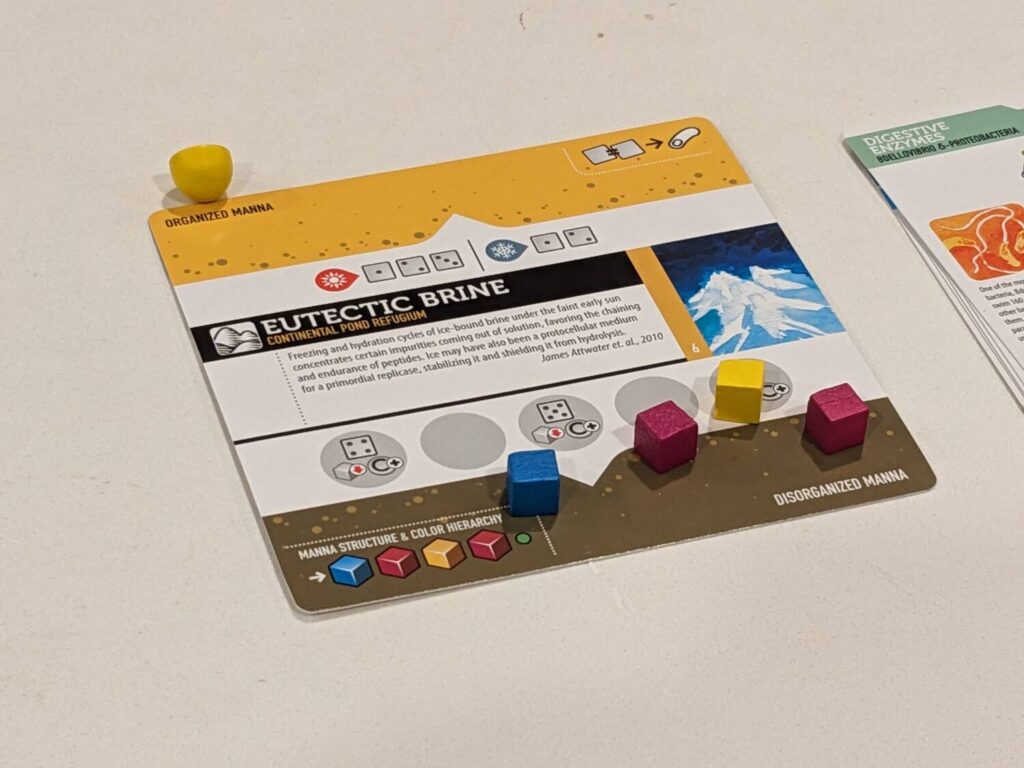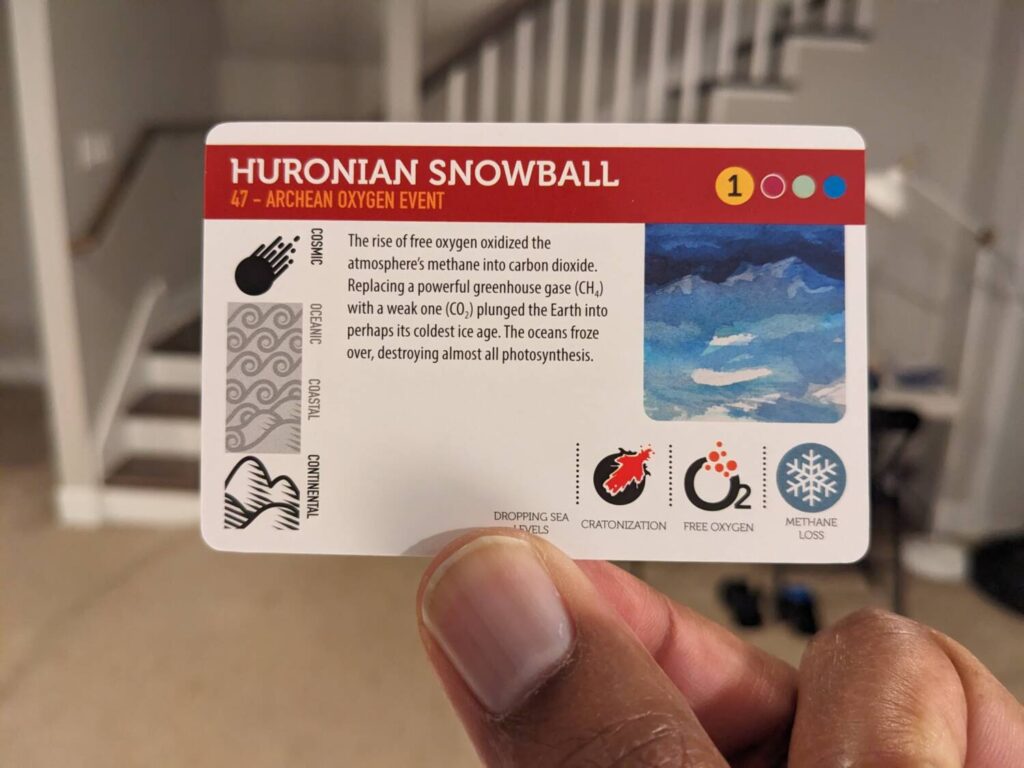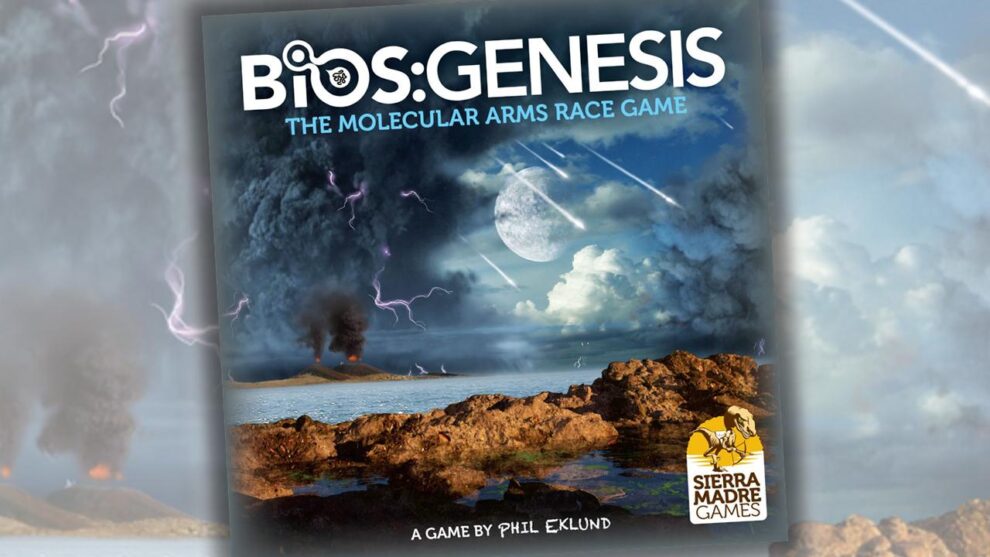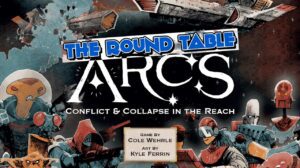Disclosure: Meeple Mountain received a free copy of this product in exchange for an honest, unbiased review. This review is not intended to be an endorsement.
Bios: Genesis (2016, Ion Game Design) has a wild distinction across the nearly 500 games I have reviewed here at Meeple Mountain: it was the hardest teach of any game I have ever tried to table.
That’s saying something, in part because some of Ion’s other really challenging games were easier to teach than Bios: Genesis. It is harder to teach than Voidfall. It is harder to teach than Feudum, a game that was taught to me over the course of about two hours by an experienced player. It’s harder to teach than Civolution, the most complex teach I sat through in 2024.
Nope…Bios: Genesis is harder than them all. That affected my entire experience with the game; for months, I tried to squeeze Bios: Genesis in with other games on my review nights, but was too intimidated to try and teach it then play it within the time constraints of a given evening. I did two solo plays before trying to do a multiplayer game, but got a number of rules wrong in those initial plays, so I did a third solo play to ensure I had everything down pat. I went looking for other players in my networks who knew the other Bios games (Origins and Megafauna), but only one person raised their hand to play Genesis again, and he gave me the distinct feeling he was OK if that game night never materialized.
Bios: Genesis was quite a journey. And it was easy to see why the game was such a difficult onboarding experience right from the jump—designer Phil Eklund somehow turned the process of creating life on earth into a board game but used as many highly technical scientific terms as possible to educate players. That proved to be a massive burden for those brave enough to play it.

Yes, I Said “Chemiosmotic Phosphorylation”
Bios: Genesis is part one of the Bios trilogy, per the game’s rulebook, although I admit that I thought part one was Bios: Origins, given the naming convention. Bios: Genesis is “The Molecular Arms Race Game”, where 1-4 players try to score the most points by creating life over the course of the first four billion years of history. The scope is huge, which I love, and Eklund leans hard on the technical terminology in every aspect of the game’s design.
There are landforms that enter play in each round. Bionts that must be placed, manna that must be organized, and “extremophile crises” that must be navigated. And that’s just in the first two phases of each of the game’s rounds. Ultraviolet radiation, smite events, oxygen spikes; gosh, even cancer has to be considered in Bios: Genesis. Aftershock events across the game’s three eras (Hadean, Archean, and Proterozoic) add additional changes that players must navigate in order to succeed. And, as one of the four parasites in each game, players will later find ways to leach onto other organisms by attaching themselves to a “Host Organism” of an opponent to score additional points, as long as they meet certain conditions or find ways to steal mutation cubes from a Bacterial Host.
Lots of games have their own unique terminology that players have to adapt in order to succeed. Bios: Genesis takes it one step further, because to even learn Bios: Genesis, you have to be, well, smart. I’d say really smart. And you have to be able to pronounce words you have likely never seen before. Where do you land on Bacteriorhodopsin? Phagocytosis, perchance?
Do you even know what Stromatolites are?
Because, if you do, that’s where Bios: Genesis really opens up. To call Bios: Genesis a niche of a niche is a massive understatement. I am so excited to offer my review copy to my buddy Gideon, a former science teacher who loves the Ion catalog. These days, I think it’s really hard to find people who are truly nerds, but I think that Bios: Genesis is great for a person who really wants a gaming experience where they will learn something, maybe a LOT of somethings, over the course of a two-hour game experience. And for a dedicated superfan, Bios: Genesis does feature a solo mode, so nerding out on your own is very easy to do here.
Easy, if you can learn the rules. Now, as a game, Bios: Genesis leans hard into its world…but how does it play?

Life is a Game of Chance
At the end of the day, Bios: Genesis is a dice game. I loved the rules intro by designer Ryan Spangler (Sol: Last Days of a Star), who wrote a foreword for the Bios: Genesis rulebook: “Simple, really. You roll a lot of dice, hang out in the Green Rust Fumarole, and create life.”
That is true, and once I had the rules down, playing solo was a breeze. Each of the game’s five phases per round feature an event deck resolution, biont assignments to refugia cards, then dice chucking—first to create life, then attempts to kill it off in the Darwinian roll phase. After all that, players can use catalysts—a generic resource that plays the role of other game effects, based on the situation—to buy new mutations for the bacterium in their tableaus. I was able to do solo games in about an hour, and even in my three-player game, that play lasted about 75 minutes because the game ended in Armageddon, a game effect triggered by four consecutive matching temperatures on event cards.
The dice chucking? Mildly interesting, but sadly not a home run. Many of the game’s initial rounds end in failure; not many dice can be rolled unless a refugium has enough bionts and organized manna, and if no doubles have been rolled, refugium can’t be flipped to their microorganism side, so all of my plays stalled somewhat badly early on.
Now, when Bios: Genesis gets to its midgame, there’s something there. Players have access to more bionts, they may have a catalyst income that can be used during the purchases phase, and they may be managing one or two microorganisms as play moves into the middle or late stages of the Archean Era. Before parasites become a thing, and before mutations add chromosome cubes to the game, I thought Bios: Genesis was much less interesting. That meant that each play featured a number of rounds that were purely mechanical—blah blah blah, let’s get to the part where there’s a bit more action.
For a shorter game, that’s not the worst thing in the world, especially during solo play. But I could see it in the eyes of my two opponents during my three-player game…when do we get to do the juicy stuff?, their eyes seemed to say.

Science Junkie?
Bios: Genesis is for a very narrow audience. While I enjoyed the teaching aspects of both the cards and the rulebook—like other Eklund rulesets, Bios: Genesis is dense with information listed in the footnotes—the gameplay was not as strong as other Ion products I have enjoyed this year, like High Frontier 4 All, DerrocAr: The Week of Five Presidents, or Sammu-ramat.
But for those in that narrow audience? You really won’t find many, if any, games that embrace the scientific subject matter quite the same way. Bios: Genesis is a tidy production, in a small square box similar to the Pax Transhumanity and Greenland offerings, also from Ion. The player aid is very good and once I finally got the rules down, I was able to use that aid for most of my round phase questions. Even the sides of the box serve as an aid for other players in a pinch.
Unfortunately, one of the rulebook’s aids never came to be; Heavy Cardboard was initially set to do a tutorial for Bios: Genesis, but that tutorial was never completed. That left only limited sources to find anyone who had built a teach/tutorial video, making it harder to get this one in front of my gaming friends. (The site Bits o’ Board has a 51-minute learn-and-play that I used, but I had to watch it twice in full to really grasp what the game was going for.) If you can, find a superfan who already knows the game’s systems when trying to learn it, because the rulebook is exceptionally dense.
Bios: Genesis might be my only foray into the Bios series based on these initial plays. We’ll see if I can find a group willing to invest in the full system!











While both Bios: Genesis and Bios: Megafauna fell a bit flat for me due to the super-high luck/randomness factor, Bios: Origins is far and away my favorite civ-game (and I grew up on Avalon Hill Civilization in the 80s). Conceptually, how the civilizations evolve and interact, absorb new ideas and cultural foundations is amazing. Its management of civ-game staples like tech tracks and random calamities is distinct. Evolving from a barely-self-aware band of primates into shooting intercontinental missiles at your enemy while they’re luring away your cities with a religious crusade, and the third guy is trying to get a global philosophical movement afoot to discredit either war or religion altogether? Great stuff.
Harder than voidfall is an instant fail in my book. Teaching that game alone is such a bear but the payoff is you get to play voidfall. Thanks for leading with that, definitely a good qualifier.